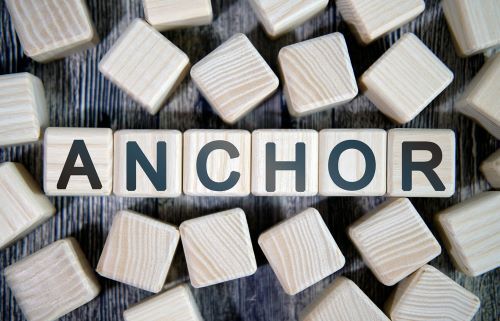
 Data Structure
Data Structure Networking
Networking RDBMS
RDBMS Operating System
Operating System Java
Java MS Excel
MS Excel iOS
iOS HTML
HTML CSS
CSS Android
Android Python
Python C Programming
C Programming C++
C++ C#
C# MongoDB
MongoDB MySQL
MySQL Javascript
Javascript PHP
PHP
- Selected Reading
- UPSC IAS Exams Notes
- Developer's Best Practices
- Questions and Answers
- Effective Resume Writing
- HR Interview Questions
- Computer Glossary
- Who is Who
Anchor Text And Tricks to Improve Your Link Text
Are you tired of feeling your link text isn't up to par? Have you been wondering what anchor text is and why it's so important? Learning more about anchor text could be a key factor in elevating its performance if you're looking to give your website a competitive edge.

In this blog post, we'll break down everything you need to know about anchor text and its importance in SEO strategy. So buckle up and read on ? mastering the power of anchor text could be just the link boost that takes your online presence from good to great.
What is Anchor Text?
Anchor text is the text that appears in a hyperlink. Anchor text is a crucial element in search engine optimization (SEO). It takes the user to another webpage or a different section of the same webpage. Anchor text helps search engines to understand the context of the linked page and determine the relevance and authority of that page.
In simple terms, anchor text acts as a descriptor for the linked page, and it can significantly impact the search engine ranking of the linked page. Therefore, it is essential to use relevant and descriptive anchor text while linking to a webpage. It appears in a different color (often blue) than regular text to mark its uniqueness. Sometimes, you can also notice an underline.
Why Is Anchor Text Important?
The Google rankings of your website might be improved by using relevant, detailed anchor text. It may also improve user experience.
That's because both readers and search engines use anchor text to determine the subject matter of a linked website.
So, relevant anchor helps Google bots understand your website structure and context about how different pages are related to each other.
Different Types of Anchor Text
There are several types of anchor text. However, you must know the differences between them to use them effectively. Some common types of anchor text include ?
Exact Match Anchor Text ? This is when the anchor text precisely matches the target keyword of the linked page. For instance, if the target keyword is "best laptops," the exact match anchor text would be "best laptops." Exact match anchor text was heavily used in the past, but it has become less popular after Google's algorithm updates, as spammy websites frequently abused it.
Partial Match Anchor Text ? This is when the anchor text contains a variation of the target keyword. For instance, if the target keyword is "best laptops," the partial match anchor text could be "best laptops for students." Partial match anchor text is considered more natural and effective than exact match anchor text.
Branded Anchor Text ? This is when the anchor text contains the brand name of the linked page. For instance, if the linked page is "Apple MacBook," the branded anchor text could be "Apple." Branded anchor text is a safe option and helps to establish the brand's authority.
Generic Anchor Text ? This is when the anchor text uses generic terms such as "click here," "read more," or "visit this page." Generic anchor text does not provide much context to the linked page and is not very effective in terms of SEO.
Image Anchor Text ? This is when the anchor text is linked to an image rather than text. Image anchor text is not as effective as text anchor text, as search engines cannot read the text within an image.
How to Improve Your Anchor Text
After discussing different types of anchor text, let's move on to optimizing your anchor text for search engine results.
Effective anchor text for SEO is ?
Brief
Relevant to the page you're linking to
Not stuffed with keywords
Here are a few general guidelines for building good anchor text ?
Use Descriptive and Relevant Anchor Text ? The anchor text should be descriptive and relevant to the linked page. When the text is relevant to your site structure, it could help your website rank faster. The anchor text should clearly indicate what the user can expect to find on the linked page. Use partial match anchor text, which contains a variation of the target keyword, as it is more effective than exact match anchor text.
Avoid Overusing Exact Match Anchor Text ? Avoid using exact match anchor text repeatedly, as search engines perceive it as spammy. Instead, use various anchor text types to create a natural link profile.
Use Branded Anchor Text ? Use branded anchor text to establish the brand's authority and to create a natural link profile. Branded anchor text is safe and can be used as a default option.
Use Anchor Text on Relevant Pages ? Use anchor text on relevant pages related to the linked page. For instance, if the linked page is about laptops, use anchor text on pages that are related to laptops, such as technology or review websites.
Avoid Using Generic Anchor Text ? Avoid generic anchor text such as "click here" or "read more." Generic anchor text does not provide much context to the linked page and is not very effective in terms of SEO.
Use Varied Anchor Text ? Use varied anchor text to create a natural link profile. Use a mix of exact match, partial match, branded, and generic anchor text to avoid being penalized by search engines.
Keep Anchor Text Short ? Keep the anchor text short and to the point. Avoid using lengthy and complex anchor text that can confuse the user and dilute the relevance of the linked page. The recommended anchor text length is five words or less.
Use Anchor Text in Moderation ? Avoid overusing anchor text, as search engines perceive it as spammy. Use anchor text in moderation and ensure that the anchor text is relevant and provides value to the user.
Keep Anchor Text Consistent ? Keep the anchor text consistent across all pages and ensure that it matches the content of the linked page. Consistent anchor text helps search engines to understand the context of the linked page and to rank it accordingly.
Use Internal Links ? Use internal links to link to relevant pages within your website. Internal links help to establish the structure of your website and to guide users to relevant content.
Put quotations around the entirety of your keyword ? By enclosing the full keyphrase in quotes, the analysis will only match the entire phrase rather than the individual words, helping you avoid getting a red bullet for the focus keyphrase in the link check.
Conclusion
In conclusion, using anchor text can be an incredibly effective way to build a high-authority site. But, it is important to ensure that the link text chosen is relevant to the page and/or topic being linked to and meaningful, as this will lead to better click-through rates and higher rankings for pages in search engine results. Furthermore, it is important to know what kind of anchor texts have been used recently so as to increase organic traffic and thus improve your website's performance. When implemented correctly, anchor text is a great way to promote webpages or posts, build internal links on your site, and show potential customers that your content has authority.

